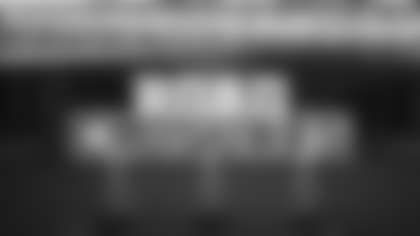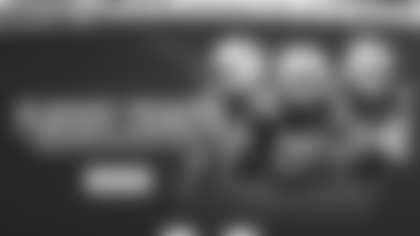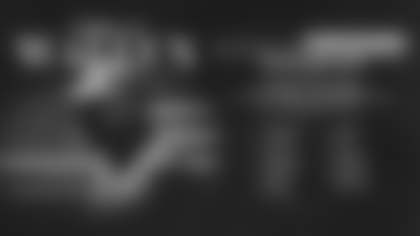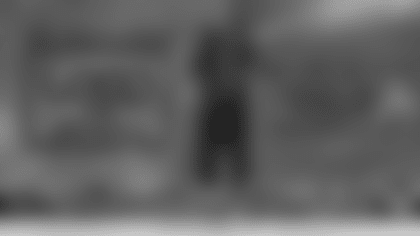Q: The Colts had a bye this past weekend. Was it a 'bye' week
for the team's president?
A: I bought for the grandchildren. That was the buying I did. And that was fine. That was a lot of fun.
Q: Did you watch a lot of football?
A: I watched football. Not much Sunday, but I watched a ton Saturday. I watched Texas. I watched Notre Dame. I watched the Saturday night games – stayed up until 1:15 in the morning watching the (New York) Yankees (against the Los Angeles Angels in the American League Championship Series). I had a good watching day on Saturday.
Q: The bye week has come and gone. Now, the long haul for the Colts begins. What now?
A: Health is always the major concern. We battled through that in the defensive backfield, and it looks as though we're getting a little bit better there. That's the number one concern. Number two is we have to continue to protect the football the way we have. We've been very good in the turnover margin, and we have been particularly good on offense there, so we have to continue that. We haven't given the opposition too many gifts. If you do, that's a recipe for disaster. We have to continue to play the good defense we've been playing, particularly in the scoring area, where we're one of the tops in the league. If we do that, then we have a chance. But I emphasize again, with both fingers of both hands crossed, health is the key thing. All of the predictions and all of the analysis that you do means absolutely nothing, if your team is banged up.
Q: Injuries really do make an impact at times . . .
A: The primary example I can give you is the Cincinnati Bengals. I told everybody that asked that I thought the Cincinnati Bengals – based on what we saw in the preseason game against them – were a playoff team. No question about it. They should have been undefeated but for a weird break that occurred in the opener against Denver. They lose (defensive tackle Domata) Peko. They lose their outside rusher, (defensive end) Antwan Odom. Now, they have a hard time containing the Houston passing game. It's very difficult when you lose bellweather players to be the same football team. Now, I still believe that Cincinnati is definitely a contender as long as their quarterback (Carson Palmer) stays healthy. But with those two guys on defense, they were a pretty darned good defense – close to dominant. I hope Peko will be back. Odom, I heard may be gone for the season, which is very unfortunate, but that's what injuries do.
Q: St. Louis is coming in on a 16-game losing streak dating to last season, but the Rams are still dangerous, are they not?
A: As our buddy, (ESPN announcer) Chris Berman, is fond of saying, 'That's why they play the games.' That was never more true than this weekend. Secondly, the losses last year with St. Louis don't mean a thing. It's a new coaching staff, a new management staff, a brand-new approach. They still have an excellent quarterback (Marc Bulger) who is back and healthy. They have Donnie Avery, who's a home-run hitting wide receiver. We'll see what his health status is as the week goes on. And they have Steven Jackson, who is a home-run hitting running back. They have a great, great defensive mind at the helm (head coach Steve Spagnuolo), so what's not to like? They're playing at home. They took Jacksonville to overtime Sunday. We know what Jacksonville is all about. They're a pretty good football team. This is not a walkover by any means, although all of the experts will say that. But the experts don't play. So, all it is, is lots of hot air. No matter whether it's good or bad hot air, it doesn't mean anything anyway. The game is still played on the field by the players and they have capable players, especially at the skill positions.
*Q: Do you worry about losing momentum with the bye week?
*A: I've never worried about that. I think that's very overrated. You only lose momentum if you don't practice, and we will practice. We practiced Monday a little longer than we normally do on Monday. (Colts Head Coach) Jim (Caldwell) wanted to do that, because he wanted to get the tempo set for the week. He mentioned that to the team, that, 'We went longer and we did it at a higher tempo than we normally do on Monday, because we want to get you back into the swing of things.' As long as you have three good days of practice, you're not going to lose any momentum or any tempo based on something like a bye week.
Q: The Colts had a good practice last Wednesday before taking the weekend off. How important was that session?
A: For one thing, it was to the players' great credit that they went out and practiced the way they did. They really did a heck of a job, and that's the kind of players we have. That's why they're a great group to be around. They really work hard. Secondly, it was good that Jim gave them Thursday off. We went through a long, hard stretch – training camp, then through this meat-grinder of five-o-clock-in-the-morning returns after prime-time games on the road. We had three prime-time games on the road – unheard of. So, it was time to take your foot off the pedal, but they went through a very, very spirited practice on Wednesday. That was good. We gave them the rest of the week off to get rested up, healed up, and now, 'Let's get back at it Monday.' We did. Then, we'll come back on Wednesday ready to roll and get ready for a Rams team that has home-run hitters at the positions where you need them. A lot has been made over time of our having the Triplets – (wide receiver) Marvin (Harrison) and (running back) Edgerrin (James) and (quarterback) Peyton (Manning). Now, there's a new group of big-play players at the skill positions, which you have to have to win. Well, they have got it. It's no secret they can score points, especially when their quarterback is healthy, and he is.
Q: Defensive tackle Fili Moala has yet to play. Any update?
A: Yes, he is ready to play. He has not been dressed, nor has he played in the regular season thus far. He will do so on Sunday. He'll make his debut in the Edward Jones Dome on Sunday and we think he'll do fine, so we're looking forward to seeing him.
Q: Can you comment on the New England Patriots' one-sided victory over Tennessee? Was it necessary for the Patriots to score so many points?
A: I did not see the game. They did not get it where I was located. Far be it for me to comment on what anybody else does. I have a hard enough time taking care of my own job without worrying about anybody else. One thing I will say, and I'll echo Mike Golic (Monday morning on ESPN's Mike and Mike in the Morning) on his radio show, 'The idea of holding the score down – and I'm casting no aspersions here; I'm speaking generically – is not something that is sacrosanct in the NFL.' As a matter of fact, one of the last tiebreakers when you're trying to break a tie in the standings between two teams is point differential between that which you scored and that which you have given up. There's an argument that you try to score as many points as you can so that you create that point-differential tiebreaker. Some coaches do and some coaches don't, but it's there for a reason. The differential is important when it comes to playoffs. Hence, there's less issue with lopsided scores traditionally in the NFL than there are at the lower levels.
Q: You mentioned Fili Moala. That's a huge transition at defensive tackle, from college to the NFL, is it not?
A: Huge transition. First of all, it's a very difficult situation for a rookie to come in from college football and play on the defensive line in the NFL. Here are some of the reasons. First of all, a college defensive lineman who's good enough to make it to the NFL is usually very dominant at the college level. He's playing against very inferior people compared to what he's going to play against in the NFL. As one defensive lineman told me, 'My first practice in the NFL was like a punch right in the mouth.' He said, 'I had no idea that it was this intense or those offensive linemen were that good.' Secondly, many of them have to unlearn collegiate techniques and then learn professional techniques for the simple reason that the athletes are better, the blocking schemes are more crisply executed. You cannot simply overpower a player the way you could at the collegiate level. You have to play with skill and you have to play with technique. That's very important. Technique is extremely important at the pro level. It's not quite as important, nor is it taught as much, at the collegiate level. It's a very difficult transition and finally, for any rookie, the speed of the game is incredibly arresting. It's hard to describe in words the difference between the speed of play in the NFL and the collegiate level. It is day and night. If you compare the jump from Triple A baseball to the Major Leagues and you compare the jump from college basketball to the NBA and you compare the jump from college football to the NFL, the biggest jump – the farthest distances that a rookie has to go – is in the NFL. Most people presume it's the NBA. That's not true. If you can score, you can score anywhere, but in the NFL, you'd better be able to play. You'd better be strong. You'd better be stout. You'd better be well-conditioned. You'd better be a technician. Even then, you're probably only batting .500 against the guy opposite you because he's all of those things and experienced as well.
Q: Is that the reason for the Year 2 jump?
A: Yes. That's correct. That's the biggest jump in sports – the maturation process and the production increase between a rookie year and the second-year player. The second-year player understands what he's up against. He understands what he has to do to prepare. Don't forget: the year previously he was preparing for the draft, listening to his agent and his mother and father and all the well-wishers telling him how he was going to set the NFL on fire. Then, at the same time, he learns the game a lot better. Through the offseason program he develops technique-wise. It's very important. He understands the game better. For example, Peyton Manning went from 3-13 with a very negative interceptions-to-touchdowns ratio in his rookie year, and he's the epitome of worker. When you look up the word, 'worker' in the dictionary, Peyton Manning's picture appears. He went from 3-13 to 13-3 and a positive interception-to-touchdown-pass ratio the second year. That's what happens to all rookies. Not as many make quite the jump Peyton did, but they do make a gigantic leap.
Q: Manning really seems to be one of the most-dedicated players in the NFL . . .
A: He's certainly among the greats of the game when it comes to that. No question about it.
Q: Can you expand on the situation involving defensive tackle Ed Johnson?
A: Sadly for him, the effort and the production in his play had really fallen off almost since Week 1. It's directly related to his weight. He was unable to get control of his weight. He was about 15-to-20 pounds overweight and couldn't really take it off. Jim Caldwell about three weeks ago called him in and essentially said to him, 'Ed, you have to pick it up. The production, the hustle, the effort and the ability to lose the weight has to be improved. Otherwise, we're going to have to make a change.' A couple of weeks later, I called him in and said, 'Ed, I'm really concerned about the weight. I don't see the kind of movement in the weight that we think is important. That's hurting you in terms of pursuit and the kind of sustained effort over a long period of time that it takes to win in our defense.' He said he would try, but he hadn't had much success with it. To his credit, he tried a little bit with extra running and things of that nature, but after the Tennessee game when we had our Monday morning staff meeting the defensive coaches were very adamant about the fact that Ed had not measured up to the standard of performance they require and that they wanted to make a change. We had a lengthy meeting about it. Both Jim Caldwell and I discussed it with them at length and went into it in great detail, and, in the end, Jim Caldwell decided it was the right thing to do. He already had put Ed on notice about it. So, we made the change. Dan Muir and Fili Moala will be in there, and that's the way we'll go. To quote Jim Caldwell, 'In all the years we've been here we never have sacrificed effort.' We have never, ever allowed the standard of performance to go below what we require in the effort department no matter what the extraneous circumstances. That's the decision we made, and we think it's the right one. Ed happens to be a very popular player and he's a popular guy in the locker room. To tell you the truth, it came as somewhat of a shock to his teammates. But I think that in the end, we made the right decision. Most importantly, we're sticking with the standard of performance that (end) Robert Mathis has set, that (end) Dwight Freeney has set, that (safety) Bob Sanders has set, that (cornerback) Kelvin Hayden has set, that (cornerback) Marlin Jackson has set, that (linebacker) Gary Brackett has set. We're not going to lower that simply because we feel like a player has the potential to be better, and Ed does. Ed has the potential to be a good player. As I told him when he left, I hope he looks upon this as a positive and takes it upon himself to really get in great shape and stay there and have a good career for himself in the National Football League. But it wasn't working to our satisfaction, and we didn't feel he was meeting our standard of performance. That's not something we're going to compromise.
Q: And kicker Adam Vinatieri?
A: In Adam's case, the week prior to the Tennessee game, he had developed some pain along the side of his leg. Adam is so tough mentally and physically and emotionally that he never said a word about it. Toward the end of the week, he said, 'You know, I have this pain on the joint line.' They went and tested it – I believe on Monday – with an MRI and some other things and found that there was some loose cartilage there along with some irritation in the capsule that surrounds the joint. The irritation was reasonable and to be expected because Adam had had that same cartilage operated on back in perhaps April, very close to mini-camp. The loose cartilage was something new and something the doctors felt needed to be addressed. They felt it needed to be addressed, because they weren't sure, even though Adam felt very strongly that he could kick through the pain, that it wasn't going to get worse over the course of the season and reach a point, let's say around Thanksgiving, where he could no longer stand the pain and that there would no longer be appropriate kickers out there to replace him. They said, 'Let's do the arthroscopic surgery now. Let's get it out of the way. Let's get him fully rehabbed.' We said, 'That's fine. We can get a kicker now who will certainly fill the bill for us and do a good job.' We did in Matt Stover. We'll just move on from there. Adam already has begun his rehab and Matt is here and rarin' to go. We think like most of the things that have happened this year, that it will be a relatively seamless transition. I no longer put any time frames on these things, because if you hazard a guess it becomes graven in stone and I don't want to do that, because it's unfair to the player. But it's not expected he'll be out for the season or anything approximating that. We just hope it's normal rehabilitation.
Q: Do you think the overtime rule will be changed?
A: I will give you the feeling of the Competition Committee, which I think it's fair to say is unanimous. First of all, unlike the colleges, we play 20 games and then the playoffs. You can go four more in the playoffs, so you can play a total of 24 ballgames. The colleges play 12 or 13 at the maximum – exactly half of what we do. We are very concerned about injuries. We have a 53-man roster. They have a 106-man roster. It's a very different situation, so they can play the kind of overtime where they theoretically can play for seven or eight overtimes and not worry too much about injury. We worry greatly about injury. Secondly, when the overtime situation was first developed, it was the feeling of the Competition Committee at that time that they wanted to totally eliminate ties. At that time, the accepted wisdom was that ties were very bad for the game. No one wanted ties, period, because a tie is, in effect, nothing. It's not a win and it's not a loss, but it can put you into the playoffs, because ultimately playoff selection is based on percentage over the 16 games, so even though you didn't win the game, you beat another team into the playoffs because of that. They wanted to totally eliminate ties, and in so doing, they said, 'Let's make this, in effect, sudden death; the first team to score wins. That way, we'll be sure to eliminate ties or go a long way towards doing it.' There are many people in the National Football League who feel that that's the right way to do it, because they are focused on who makes the playoffs, not whether an individual team – whether Peyton Manning; let's put it on us – gets a possession in an overtime game. That occurred last year in the playoffs in San Diego. Now, let me say this about the San Diego game for the umpteenth time: 'We lost that game because we didn't control it within four minutes of regulation time.' That game was ours to win, and we did not do it. We lost it. So, we had no right, in my view, to a possession in overtime. We lost that game. San Diego should never have gotten the ball back, and when they got it back, they never should have gotten it in the field position they did. I give them great credit for winning the game, but we lost it. It was within our control. So, there are people who say, 'Well, I think both teams should have a possession.' OK, if that's the way you feel, then are you going to have overtimes that go on forever? The answer, of course, is, 'No. Let's do it with each having one possession.' 'Well, what if we have a tie at the end of that?' Do we want ties? I bet you if we went to that rule – and I know we would have many more ties – people would be hollering about the fact that, 'Well, a tie is like kissing your sister; I don't know if we should have ties . . .' No one is happy in these sets of circumstances, so the Competition Committee felt like, 'Listen, let's leave well enough alone. We have a situation where overtimes do not cause many injuries. Most do not go for prolonged periods of time. Secondly, we eliminate ties.' We had a tie last year between Cincinnati and Philadelphia, which put Philadelphia in the playoffs. It was a long period of time between ties. That's what the founding fathers intended. If you're going to change the overtime rule, you're going to need to come to grips with the fact that there will be more ties. I've heard people say, 'First team to six points wins.' Well, that might indicate three possessions, and that's a longer overtime than you really want. You're ensuring yourself of a longer game, which we really worry about. I recognize that fans don't and I certainly recognize that media people don't, but we worry about it greatly.
Q: Are the Colts looking to upgrade the return game? There are rumors out there that the Colts might be interested in Josh Cribbs (of the Cleveland Browns) . . .
A: We're always looking to upgrade our team in every area. I can assure you I've had no discussions with anyone from the Cleveland Browns about Josh Cribbs. I'm not sure the Browns have made any overtures to anyone about Josh Cribbs. They certainly haven't to us. I'm probably skirting the tampering rules now anyway, but the bottom line is that this is an internet rumor and has no real basis in fact. We'd like to get the return game better. That's obvious. It looks like barring someone good coming on the open market we'd have to do it from within.
Q: Can you discuss the rule under which a defender can knock a receiver out of bounds if he's in the air and have it called an incomplete pass? That was the force out rule and it was changed recently . . .
A: That was a rule that was hotly-debated at the Competition Committee. Frankly, in the end I voted for it, but I did it reluctantly and without a lot of enthusiasm. Essentially, the reason for it was that the officiating department felt that it was very difficult for them to call it. I don't think that's a reason why you should change a rule philosophically. Secondly, I worry that people will encourage real cheap shots on receivers in the end zone in an attempt to try to knock them out of bounds. Now, fortunately, I don't think that situation has occurred with any degree of regularity. At least I haven't seen it. That's a good thing. But I still believe in the interest of a more wide-open game, you ought to have the ability to make a judgment that the player would have come down with his feet in bounds if he had not been driven out by the defensive back. I guess, in the end, it probably cuts both ways. There has not been a lot of interest in the rule nor a lot of controversy surrounding it. It has been in for two years. I guess it probably has worked out OK, but I voted for it reluctantly because the other members of the committee felt strongly about it. We try to present a united front whenever we can, but I was not enthusiastic about it.
Q: Has there been thought to changing the running back rotation? Right now, Joseph Addai is starting with rookie Donald Brown playing the backup role . . .
A: Right now, there's no plan to change the rotation. We feel pretty good about it. We think it has been successful for us. Donald is a rookie. Traditionally, rookies wear down toward the end of the season, so we're trying to husband his carries early as we did with Joseph when he was a rookie, to make sure he's healthy and viable at the end. That leads us to the rotation we have now. It has served us well, and I think we'll stay with it.
Q: Can you discuss wide receiver Hank Baskett and the role he might play going forward?
A: He has been doing a good job in practice. He is getting acclimated to the offense. It's a very different offense than that which he played in Philadelphia. He is a good, solid contributor on special teams and that speaks to his professionalism and his dedication and his work ethic, and I think you'll see him more in a pass receiving role as the weeks go on.
Q: What happens when some of the injured players get back?
A: It's an interesting and nice dilemma to have. Number one, let's address the safety issue. If and when Bob (Sanders) gets back, I think you're going to want to be a little careful with how many snaps he plays at the outset. This will be in effect preseason for him, so you have to be a little careful. Secondly, you have a very capable player in Melvin Bullitt who is manning the position right now. Barring injury, you would probably see Melvin get some reasonable amount of playing time because you want to be careful with Bob going in and get him ramped up in a reasonable and judicious way. With respect to (cornerback) Kelvin (Hayden), I think the injury situation is such that Kelvin would probably get in there at pretty much full go. Now, if you had a 70-play game such as we had in Miami, you certainly would get him out at some period of time in the early going and then of course, Jacob Lacey and Jerraud Powers would be the other two defensive backs who play pretty consistently. All three would be in in the nickel. Now, if you want to use a specialized nickel, here's where Bullitt comes in. He's capable of being a nickel back or a dime back as is (safety) Antoine Bethea. It gives you a little more flexibility in terms of what you can do in certain situational substitution-type things. That's something to look for as time goes by. When (cornerback) Marlin Jackson gets back, we're in hog heaven if everybody is healthy at that time. But in my experience, that's never quite the case. We strive very hard to try to build a 53-man team. Now, you don't always get there. The best teams get to 47, 48 perhaps, where those are all guys you can count on to play winning football. I think we're pretty close to that. I know we are in the defensive backfield. I think we're pretty close to it on the defensive line. There are some other areas where we may be a bit shy, but, by and large, we have a pretty deep team this year. We've always proven that with all the injuries in the defensive backfield. You're going to need everybody before it's all over. This isn't like high school or college football where, 'Well, this player's a starter, so he's back in there and the other player doesn't see the field at all.' Special teams are critically important. Situational substitutions are critically important. The more good, healthy players you have the better off you are.
Q: A final thought on the Colts as they head into St. Louis . . .
A: We're in good shape injury-wise, I think, and we're in good shape mentally and physically, ready to go. We need to have three good days of practice and get ready to concentrate on our next opponent only, which is St. Louis – a dangerous offensive ball club with a pretty darned good defense. (Defensive end) Leonard Little is playing as well as ever. They took Jacksonville to overtime, so on any given Sunday – that's for sure in the National Football League. We have our hands full on the road. That's the one we're concentrating on and pointing for.















